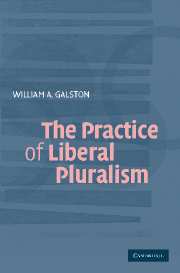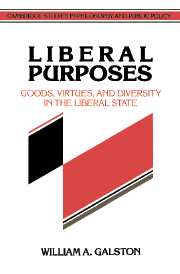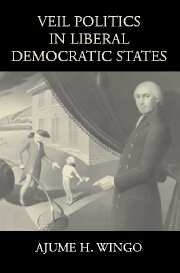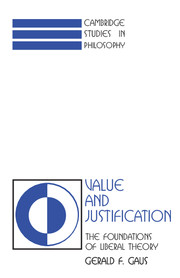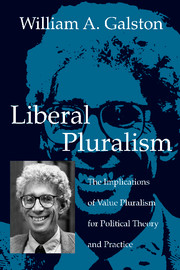
Liberal Pluralism
The Implications of Value Pluralism for Political Theory and Practice
$39.99 (P)
- Author: William A. Galston, University of Maryland, College Park
- Date Published: May 2002
- availability: Available
- format: Paperback
- isbn: 9780521012492
$
39.99
(P)
Paperback
Other available formats:
Hardback, eBook
Looking for an examination copy?
If you are interested in the title for your course we can consider offering an examination copy. To register your interest please contact [email protected] providing details of the course you are teaching.
-
William Galston is a distinguished political philosopher whose work is informed by the experience of having served from 1993-1995 as President Clinton's Deputy Assistant for Domestic Policy. Isaiah Berlin first advanced the moral theory of value pluralism in the 1950s and it subsequently was developed by a number of distinguisthed scholars, including Galston. In Liberal Pluralism, Galston defends a version of value pluralism for political theory and practice. Against the contentions of John Gray and others, Galston argues that value pluralism undergirds a kind of liberal politics that gives great weight to the ability of individuals and groups to live their lives in accordance with their deepest beliefs about what gives meaning and purpose to life. This account of liberal pluralism is shown to have important implications for political deliberation and decision-making, for the design of public institutions, and for the division of legitimate authority among government, religious institutions, civil society, parents and families, and individuals. Liberal pluralism leads to a vision of a good society in which political institutions are active in a limited sphere and in which, within broad limits, families and civil associations may organize and conduct themselves in ways that are not congruent with the principles that govern the public sphere. William Galston is Professor, School of Public Affairs, University of Maryland and Director at the Institute for Philosophy and Public Policy. He is the author of Liberal Purposes (Cambridge, 1991), which won the Spitz Prize. Galston's other books include Justice and the Human Good (Chicago, 1980) and IKant and the Problem of History (Chicago, 1975). He is also a Senior Advisor to the Democratic Leadership Council and the Progressive Policy Institute.
Read more- Sales angle is Galston - both as writer and political philosopher and actor. No other book in contemporary political theory offers that combination
- Redeployment of ideas of Isaiah Berlin
Reviews & endorsements
"This is an important task, which Galston fills with elegance and clarity." Philosophy in Review
See more reviews"Recommended for upper-division undergraduates and above." Choice
"Galston's ideas concerning the nature of value pluralism as presented in Liberal Pluralism are both interesting and convincing." Perspectives on Politics
"Liberal Pluralism would work well in a course exploring political theory beyond current partisan politics. Galston's classical liberalism, tempered by a rejection of the radical individualism now endemic in much American political discourse, is a fine contribution to the field." - Journal of Church and State, Richard Heyduck, First United Methodist Church
Customer reviews
Not yet reviewed
Be the first to review
Review was not posted due to profanity
×Product details
- Date Published: May 2002
- format: Paperback
- isbn: 9780521012492
- length: 152 pages
- dimensions: 229 x 151 x 14 mm
- weight: 0.233kg
- availability: Available
Table of Contents
Part I. Introduction:
1. Introduction
Part II. From Value Pluralism to Liberal Pluralist Theory:
2. Two concepts of Liberalism
3. Three sources of liberal pluralism
4. Liberal pluralist theory: comprehensive, not political
5. From value pluralism to liberal pluralist politics
6. Value pluralism and political community
Part III. The Practice of Liberal Pluralism:
7. Democracy and value pluralism
8. Parents, government, and children: authority over education in the liberal pluralist state
9. The public framework of the liberal pluralist state
10. Liberal pluralism and civic goods.
Sorry, this resource is locked
Please register or sign in to request access. If you are having problems accessing these resources please email [email protected]
Register Sign in» Proceed
You are now leaving the Cambridge University Press website. Your eBook purchase and download will be completed by our partner www.ebooks.com. Please see the permission section of the www.ebooks.com catalogue page for details of the print & copy limits on our eBooks.
Continue ×Are you sure you want to delete your account?
This cannot be undone.
Thank you for your feedback which will help us improve our service.
If you requested a response, we will make sure to get back to you shortly.
×
